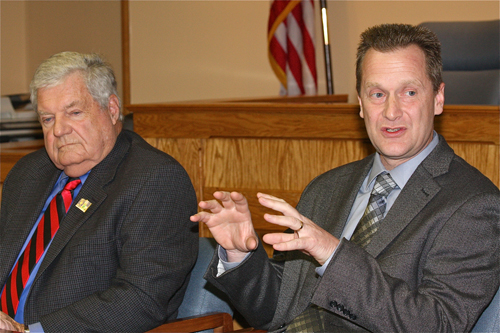Budget options: 12% tax jump, mass layoffs, or bridge loan?

Riverhead Town is facing a $4 million deficit and a potential 12.5 percent tax increase, even if its spending stays at current levels next year, according to Supervisor Sean Walter.
It can either cut spending by $4 million, which he says would require the town to cut about 60 jobs, or it could increase taxes by 12.5 percent, which would require the town to pierce the state’s two-percent tax cap.
“We can’t cut 60 employees,” Mr. Walter said. “That would be devastating.” He said it would put town services back to the levels it was at in the 1970s. About 10 employees are expected to retire at the end of this year, he said
The 12.5 percent tax increase would amount to about $220 more in town taxes for someone with property that has a $300,000 market value, officials said.
But the town also has a third option, which involves taking out a $6 million “bridge loan” against anticipated income from the anticipated sale of land at the Enterprise Park at Calverton, according to Mr. Walter. Board members originally started mulling that option as far back as February.
The town would have to repay the loan in just two years, Mr. Walter said. In order to repay the loan and prevent a tax increase on residents in future years, the town would have to sell some land at the EPCAL next year, which some officials say is not a sure thing.
“I don’t think we’re going to be selling property up there as soon as you do,” Mr. Dunleavy told the supervisor.
The $4 million deficit is a result of using that much in surplus funds to offset budget spending over the past few years. And that surplus is almost gone.
For nearly a decade, the town has been using surplus funds it accumulated from land sales and contract extensions at EPCAL to offset spending and avoid a huge tax increase. In recent years, the town has used about $4 million a year in surplus funds.
According to town finance administrator Bill Rothaar, the town had $9.75 million in surplus at the end of 2012, $5.5 million left at the end of 2013, and it expects to have between $1 million to $2 million at the end of this year.
Mr. Walter said he had hoped the town would have been able to sell some land at EPCAL by this point, but the town still hasn’t received approval of its subdivision plan for EPCAL, which isn’t expected to be done until the end of the year at the earliest. That study just arrived in town hall this week, with a public hearing on it scheduled for early September.
The supervisor said the blame for the deficit is the town’s ill-fated landfill reclamation project, which occurred before he took office.
“The general fund is balanced, but for the landfill,” he said. “That is a fact. There is no other issue here but the landfill. The landfill debt (service) this year about $4.1 million and we are behind $4 million.”
At the same time, he did take some responsibility for not preventing the town from getting into its current position since he stepped into town hall.
“I do feel a sense of failure that we weren’t able to fix this before the piper called,” he said.
The bridge loan, which would come from Suffolk County National Bank at an interest rate of about 3.2 percent, will be voted on at the next Town Board meeting, on Aug. 19, as would a resolution to pierce a state-mandated 2 percent tax cap, which would be required should the Town Board chose that option.
“I hate the fact that we’re borrowing and borrowing and borrowing,” Councilman Jim Wooten said, although he added that he feels the town is on the right track.
“I don’t want to push this down the road,” Mr. Dunleavy said, indicating he wants to just balance the budget and stop borrowing.
Councilman George Gabrielsen said he thinks the industrial lots the town proposes along Route 25 will sell fast once they become available.
In order to pierce the state tax cap, a public hearing is required, but the Town Board would only need to have a vote of 60 percent for it to pass, under state law.
Since the board has five members, all of its votes need 60 percent to pass.








